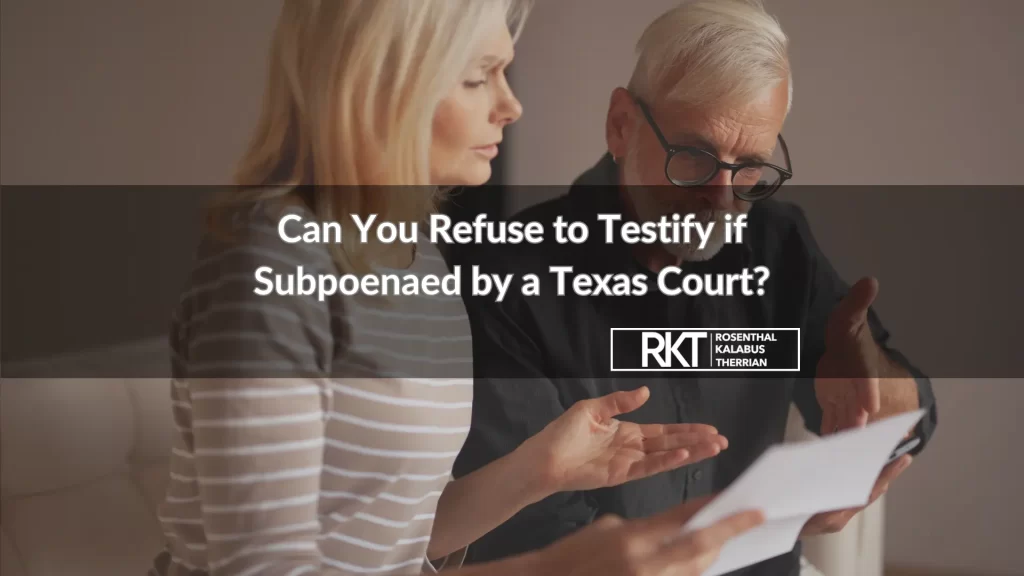
Have you received a subpoena to testify as a witness in a criminal trial or grand jury proceeding? If so, you probably have many questions regarding the law and your rights. For example, can you ignore the subpoena? If not, what are the penalties if you refuse to show up in court and testify? Can the court force you to testify if what you say might incriminate you?
Here is a brief explanation of what subpoenas are. And how you may be able to avoid testifying under certain circumstances. Remember that this is general information and not specific legal advice for you. As with any legal matter, you should speak with a qualified Collin County criminal defense lawyer.
What Is a Subpoena?
A subpoena is basically a court order directing the recipient to appear before a court for a specific purpose. That purpose is usually to testify at a criminal trial or before a grand jury. Subpoenas, such as a coroner’s inquest, may be used in legal proceedings. The subpoena is normally issued to a peace officer, such as the local sheriff. They then serve it to the recipient.
A Texas court may also issue what is known as a “subpoena duces tecum.” This order directs the recipient to bring a particular “instrument of writing or other thing desired as evidence” to the court for use in a criminal proceeding. For example, a subpoena duces tecum may direct you to bring certain records to the court that are relevant to a particular trial.
What Happens If I Ignore a Subpoena in Texas?
A subpoena is not a polite request. A legally enforceable court order requires the recipient to appear in court–or bring the requested evidence–and testify at a given date and time. If you fail to obey a subpoena, a judge can fine you up to $500 if the underlying case involves a felony or up to $100 if it is a misdemeanor trial.
The fine itself is conditional. If you later appear in court and “show cause”–i.e., provide the judge with a valid explanation of your prior failure to obey the subpoena–the court may reduce or waive the fine. The judge can reduce or waive the fine if the person shows up and testifies after initially disobeying the subpoena, although they may still be assessed court costs.
Can I Go to Jail for Disobeying a Subpoena?
In a Texas state court, a judge may issue an order known as a writ of attachment, which orders a police officer to bring you to court to comply with a subpoena physically. It is effectively an arrest warrant. And in theory, the judge could order you held in custody until the underlying criminal trial is completed.
With respect to federal court, disobeying a subpoena is considered an act of “criminal contempt.” This means you can be separately charged and tried for refusing to appear or testify in the original case. A judge can sentence you to jail for up to six months if you are convicted of criminal contempt. You are entitled to a jury trial.
Challenging a Sentence or Conviction Related to a Subpoena
If you go to jail for ignoring a subpoena or after testifying in court, challenging the sentence or conviction isn’t easy. However, our Collin County criminal defense lawyers can help by taking the following steps:
- Explaining the Grounds for Challenge: An experienced attorney knows the legal grounds on which you can challenge a sentence or conviction. Maybe the police mishandled critical evidence. Perhaps the prosecutor or police violated your rights. Knowledge is power, and our defense lawyers have it.
- Handling Legal Procedures: Texas law is intricate. A seasoned lawyer can guide you through appeals, motions, and hearings.
- Crafting a Strong Defense: If you faced a conviction due to your testimony, your lawyer could examine the process that led to the subpoena. Did the court err? Were you improperly pressured or misled? Your lawyer will investigate every angle.
- Negotiating with Prosecutors: Sometimes, it’s possible to reduce a sentence through skilled negotiations. A defense attorney can negotiate on your behalf.
- Protecting Your Rights: Remember, just because you’ve been convicted doesn’t mean your rights vanish. An attorney will ensure that your rights are upheld throughout the legal process.
In Texas, challenging a court-related sentence or conviction isn’t easy. But with the right legal expertise, you can navigate the maze. Whether it’s challenging an unjust sentence for ignoring a subpoena or questioning a conviction from testifying, we’re here to help. If you believe you’ve faced injustice, take action. The skilled and knowledgeable attorneys at Rosenthal Kalabus & Therrian will try to defend your rights.
How Can I Fight a Subpoena?
 While you cannot simply ignore a subpoena without facing the legal consequences outlined above, there are situations where you may fight the subpoena. The two most common examples are cases where the witness might incriminate themselves through their testimony, or scenarios where the testimony is subject to privilege.
While you cannot simply ignore a subpoena without facing the legal consequences outlined above, there are situations where you may fight the subpoena. The two most common examples are cases where the witness might incriminate themselves through their testimony, or scenarios where the testimony is subject to privilege.
The Fifth Amendment to the U.S. Constitution states that no person “shall be compelled in any criminal case to be a witness against himself.” The court cannot compel you to testify if doing so might place you in legal jeopardy, even if you are under subpoena. Similarly, certain legal communications are privileged–i.e., protected from compelled testimony. For instance, spouses cannot be forced to testify against one another.
If you have received a subpoena and believe constitutional or other legal privileges may protect you, you should speak with a Collin County criminal defense lawyer. Call Rosenthal Kalabus & Therrian at (972) 369-0577 today if you need immediate legal advice.
Related posts